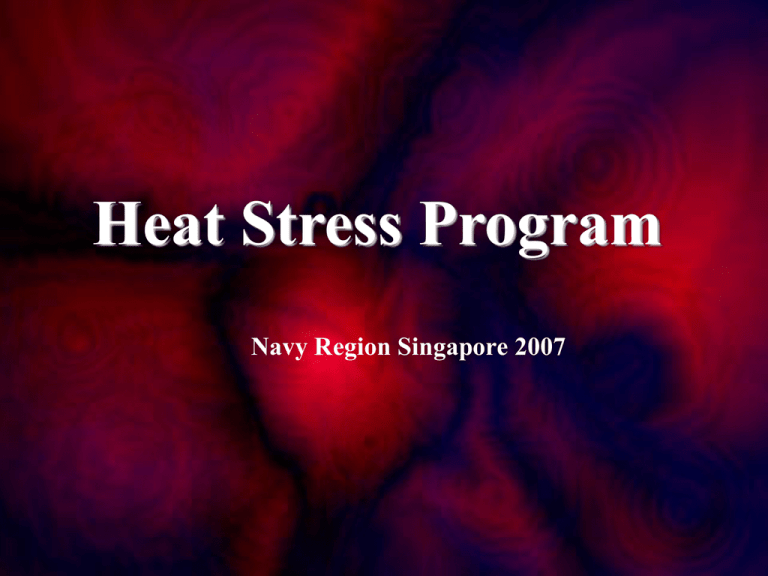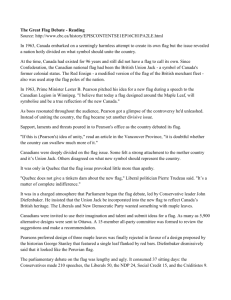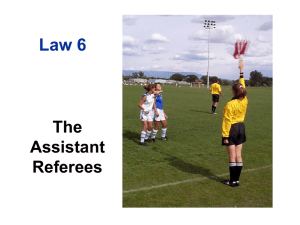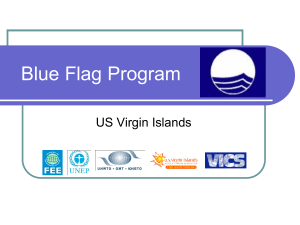Heat Stress Lesson
advertisement

Heat Stress Program Navy Region Singapore 2007 A. Physiology of Heat Stress Physiology of Heat Stress • The effect of factors on the body as it tries to regulate body temperature – The body generates heat; is sensitive to external heat factors – The body tries to regulate internal temperatures naturally – Failure of natural cooling ability causes heat stress Types of Heat Affecting the Body • • • • Air temperature Thermal radiation Humidity Air flow (ventilation) Symptoms of Heat Stress • • • • Fatigue Severe headaches Nausea Decreased performance – Physical – Mental Causes of Heat Stress High humidity + Heavy exercise + Heat Radiation + Low convective heat loss • High humidity decreases heat loss through evaporation of sweat • Heavy exercise increases metabolic heat production • Heat radiation from the sun or hot objects (asphalt, etc.) • Heat layer next to skin can be caused by lack of air currents over skin (low convective heat loss) • Poor physical condition Heat Stress Prevention • STAY HYDRATED!! • Avoid caffeine • Avoid salt tablets – Salt is generally well-replenished in food • Allow time for acclimatization – Increased tolerance to heat and more efficient cooling by body (more sweat, less salt loss, etc.) – Can be achieved in as little as 3 weeks • Two 50 minute periods of work per day (in heat) • Does not necessarily indicate that no health effects will be experienced under higher heat conditions B. Navy Heat Stress Control Program Responsibilities • CNO – Set Policy in OPNAVINST 5100.23 (shore commands) • NEPMU6 – Assist and consult with heat stress program implementation, follow through, and improvement Responsibilities • Commanding Officer (or designee) – Establishes and enforces Heat Stress Program – Ensures Heat Stress Deficiencies corrected – Requests assistance to identify problems – Reports injuries & conducts investigations C. Heat Stress Program Parameters Heat Stress Program Parameters • Monitor heat stress potential – Take outdoor WBGT readings daily • Should be taken at: – 0900, 1100, 1300, and 1500 on any day when the dry bulb > 80 degrees F. – Log readings! – Exhibit proper colored flag as needed – Consult NEPMU6 Industrial Hygiene for guidance Flag Codes • White Flag – WBGT is <80 degrees F • Green Flag – WBGT between 80 and 84.9 degrees F • Yellow Flag – WBGT between 85 and 87.9 degrees F • Red Flag – WBGT between 88 and 89.9 degrees F • Black Flag – WBGT > 90 degrees F Flag Meanings • White Flag – Heat Condition V- Extremely intense physical exertion may precipitate heat exhaustion or heat stroke in un-acclimatized personnel. Therefore, caution should be taken. • Green Flag – Heat Condition IV- Discretion is required in planning heavy exercise for acclimatized personnel. Flag Meanings Continued • Yellow Flag – Heat Condition III- Strenuous exercise and activity (i.e. close order drill) should be curtailed for new and un-acclimatized personnel during the first three weeks of heat exposure. • Red Flag – Heat Condition II- Strenuous exercise should be curtailed for all personnel with less than 12 weeks training in hot weather. Flag Meanings Continued • Black Flag – Heat Condition I- Physical training and exercise should be suspended for all personnel (excludes operational commitment not for training purposes). – Heat stroke likelihood high under conditions of high exertion. Signs and Symptoms Heat Exhaustion • Symptoms – – – – – – Profuse sweating Pale and clammy skin Pulse fast and weak Breathing fast and shallow Dizziness Nausea Heat Cramps • Caused primarily through excessive salt loss through sweating – Painful and severe cramping of voluntary muscles – Need to stop exercising, replenish fluids/electrolytes, and stretch Heat Syncope • Caused by pooling of blood in extremities – Caused by dilation of blood vessels to cool body by heat transfer to air – Can cause loss of consciousness – Cool victim quickly and begin fluid/electrolyte replacement – Transport to medical treatment facility Heat Exhaustion • Caused by peripheral vascular collapse – Symptoms include • • • • • • • – – – – – – Profuse sweating Headache Weakness Blurred vision Nausea Muscle cramps Possible loss of consciousness If unconscious, Call a Medical Emergency Loosen clothing Move victim to cooler space If faint, lower head to knees Fluid/electrolyte replenishment Transport to medical treatment facility Heat Stroke • SEVERE Medical Emergency!! • Caused by shutdown of the body’s cooling system – Body “gives up” on trying to cool down • Symptoms – Skin--Hot, Flushed, Dry • Sweating ceases – Pulse fast and strong – Breathing deep – Vomiting, Cramps, Twitching – Will go into shock • Can and WILL be FATAL if body is not cooled IMMEDIATELY by any means possible! – Ice, alcohol, remove clothing, fans, etc. • Transport to Medical Treatment right away! QUESTIONS? Questions??





















